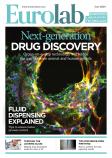Huddersfield Royal Infirmary, part of The Calderdale and Huddersfield NHS Foundation Trust , has opened its doors to a new multi-million pound Biochemistry Laboratory featuring an ADVIA® LabCell® automation solution from Siemens Healthcare Diagnostics integrating multiple ADVIA analysers. The redesigned biochemistry laboratory is striving to reduce the time taken to test sample bloods by a third and provide greater capacity for the laboratory to handle up to 3,000 blood samples every day.
Sharon Appleby, Pathology Services Manager at Huddersfield Royal Infirmary commented, “The investment brings the laboratory up to national gold level standards, which means we have the very best equipment in the country for the testing of local patients. The laboratory is a tremendous asset for the Trust and includes an amazing overhaul of the existing equipment and facilities of which we are very proud.”
“Installation of the track system went smoothly and Siemens worked well in partnership with us - we were able to transition over to the new lab design with minimal impact on our daily routine,” Sharon Appleby continued. “The new automated track with connected analysers will help us smooth out the peaks and troughs of sample management, helping our laboratory to become more efficient and ready for any changes in workload into the future.”
Geoff Emmess, Head of Sales at Siemens Healthcare Diagnostics said, “We are proud to have helped Huddersfield Royal Infirmary refit its biochemistry laboratory, which will help reduce test times and allow for sampling efficiencies to be realised. This will enable quicker diagnosis and treatment to take place, improving patient care at the hospital and surrounding GP practices.”
The Biochemistry Laboratory at Huddersfield Royal Informary includes an ADVIA LabCell automation system from Siemens , together with two sample managers, two ADVIA centrifuges, two ADVIA Centaur® XP Immunoassay systems and two ADVIA 2400 Chemistry systems.
A team of 40 biomedical scientists, support staff and laboratory assistants work within the laboratory to ensure inpatient and GP test requests are met.
Oxygen is sensed by FNR through a special cofactor – called an iron-sulfur cluster – that undergoes conversion from one form to another, smaller one, thereby causing the protein to change shape (the ‘switch’) and leading to the turning off of genes associated with growth without oxygen.
Joint lead author Prof Nick Le Brun, from UEA’s School of Chemistry, said: “This study has revealed important new details of FNR’s switching mechanism, demonstrating that the cluster conversion can go in reverse, so that the switch is a reversible one.
“This also highlights a new general mechanism by which this type of protein can be repaired if it gets damaged – which can often happen, as iron-sulfur clusters are highly reactive towards oxygen and other species that are associated with oxidative stress, which is linked to a whole host of diseases, as well as ageing.”
The findings could have a number of implications for the developments of new antibiotics and the study of iron-sulfur cluster proteins, which are found in all types of cells where they play crucial roles in many processes including respiration, DNA replication and DNA repair.
The clusters can also be damaged by oxidative stress – conditions that cause damage to cellular components that lead to the activation of specific defence responses – which is thought to be involved in the development of many diseases including cancer, Parkinson’s and Alzheimer’s.
‘Reversible cycling between partially cysteine persulfide-ligated clusters and cysteine-ligated clusters in FNR’ is published today by Proceedings of the National Academy of Sciences USA. The study was sponsored by the Biotechnology and Biological Sciences Research Council (BBSRC).
The paper is authored by N Le Brun (UEA), J C Crack (UEA), A J Thomson (UEA), B Zhang (Georgia), M K Johnson (Georgia), S Subramanian (Georgia), J Green (University of Sheffield).
The Calderdale and Huddersfield NHS Foundation Trust
Siemens Healthcare Diagnostics









